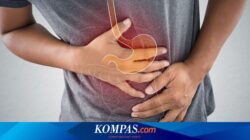Food malabsorption occurs when digestion is unable to absorb food nutrients. This condition generally occurs due to digestive disorders.
Indigestion that affects only one type of nutrient is easier to treat, such as lactose intolerance, where the body can’t accept lactose. However, if this digestive disorder affects the intestines and develops more seriously, it can result in a lack of nutrients, vitamins and minerals in the body.

Recognizing Cause
Many things cause food malabsorption. One of them is a change in the bacteria that are usually found in the digestive tract, which can be affected by an infection or certain treatment measures. Carefully taking antibiotics can at least help prevent this. This is because prolonged use of antibiotics can make it difficult for the intestines to absorb nutrients.
Also be aware of certain drugs such as colchicine-type gout drugs. These drugs can injure the intestines so that the work of the intestines in absorbing food is disrupted.
Some types of disease can also cause food malabsorption. Examples include cystic fibrosis, chronic pancreatitis, Crohn’s disease, celiac disease, HIV and intestinal worms. Likewise, diseases of the gallbladder, pancreas, and liver can be the cause of food malabsorption.
Surgery can also be one of the causes of food malabsorption. For example, removal of the gallbladder and cutting the intestines. This is because this action can change the length of the intestinal tract, becoming shorter. In addition, the intestines are swollen or infected, making it difficult for the intestines to absorb nutrients from food.
You may have heard of biliary atresia. This disease is a congenital disease that has occurred when the baby is born, which is a condition in which the gallbladder duct does not develop normally. This condition can also affect the occurrence of food malabsorption.
Sometimes this food malabsorption is caused by the body’s own condition. It is possible that the digestive organs are unable to mix food with the acids and enzymes that have been produced. Or, even the digestive organs are unable to produce the enzymes needed to digest food.
Appropriate Actions for Food Malabsorption
To ensure the body is experiencing malabsorption of food requires careful examination. One of the signs of food malabsorption is weight loss, although it is not always absolute as a sign of digestion not being able to work optimally. Generally, food malabsorption is accompanied by other symptoms, such as bloating and abdominal discomfort, diarrhea, strong-smelling stools, and feeling weak.
Food malabsorption cannot be tolerated. If it occurs in adults it can cause weight loss, while in children it can have a greater risk. In addition to losing weight, children’s growth and development can also be hampered.
Food malabsorption must be treated immediately. The doctor may perform a thorough examination, to assess the nutritional status of the patient with food malabsorption, as well as to determine the cause.
The principle of handling to overcome this condition there are two ways, namely:
- Fulfillment of nutritional needs
Restore the balance of nutritional levels, by providing intake that contains protein and replacement calories. The need for vitamins and minerals such as iron, calcium and magnesium as much as possible is fulfilled.
Handling of food malabsorption caused by certain diseases, adjusted to the illness. For example, people with lactose intolerance should avoid foods containing lactose. Administration of digestive enzymes such as proteases and lipases may be given to patients with impaired pancreatic function. The provision of other drugs such as antibiotics and anti-inflammatory corticosteroids, can be given with full consideration by the doctor, according to the condition and needs of the patient from the results of a careful examination.
If you have symptoms of food malabsorption, don’t try to treat it yourself. To determine the cause and treatment of food malabsorption should be done in consultation with a doctor.











